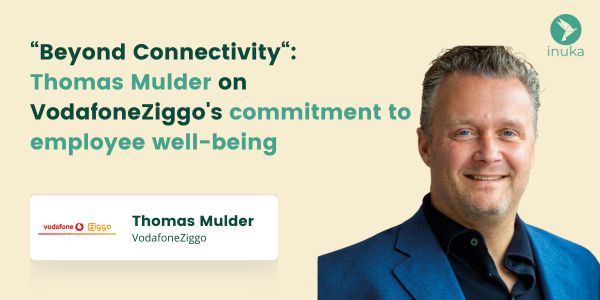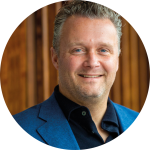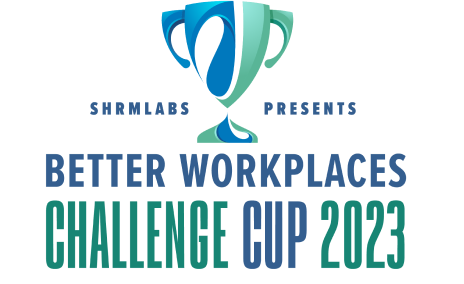“Beyond Connectivity”: Thomas Mulder on VodafoneZiggo’s commitment to employee well-being

Thomas Mulder, Executive Director HR at VodafoneZiggo, discusses the company's holistic approach to employee well-being, emphasising the importance of joy, purpose, and inclusivity, and how these principles are integrated into their broader people strategy and operational practices.
Thomas, you are the Executive Director HR and member of the Executive Committee at VodafoneZiggo. Can you introduce VodafoneZiggo and your role there?
Of course. VodafoneZiggo is a leading provider of fixed and mobile internet services in the Netherlands, driven by a powerful purpose: to bring enjoyment and progress with every connection.
We serve approximately half of the country’s population and our services reach every corner of the Netherlands, with offices in Utrecht, Leeuwarden, Groningen, Maastricht, Nijmegen, Amsterdam, and Eindhoven. Additionally, we maintain a network of 113 stores and a nationwide team of technicians. We are proud to offer a diverse range of services and to continue growing while providing the Netherlands with high-quality connectivity and entertainment.¬
Within the executive team I am responsible for our people, organisational development, internal communication, workplace facilities, and other critical aspects of our operations.

As a consumer business, how would you characterise your people philosophy?
We emphasise the concept of a ‘people agenda,’ where we closely examine the development of our entire organisation, how to foster its growth, and the broader ecosystem in which we operate, including third-party stakeholders. Ultimately, it’s about the relationship between the employee, the organisation’s purpose, the organisation’s customers, and the broader society in which we operate.
The agenda starts with what we aim to achieve with the company and what role the employee plays in that vision. How do we organise, develop, and cultivate that role, and what kind of culture best supports it?

What's VodafoneZiggo’s approach with regard to employee well-being?
Well, we are a purpose-driven organisation. When you have a purpose, you have a goal. Our motto of ‘enjoyment and progress with every connection’ naturally resonates with our customers. This applies equally to our own VodafoneZiggo family. I want ‘enjoyment and progress with every connection’ to be our daily reality at work.
When we talk about connections, it starts with the connection with oneself, your own energy balance. It’s also about the connections with your colleagues, built on trust, and of course, the connection with our customers, society, and their purpose.
Furthermore, in my opinion, you can only experience true joy when you can be completely yourself and you don’t feel the need to compartmentalize your religion, sexual orientation or cultural background. If you feel the need to conceal parts of your identity, you’re constantly preoccupied with fitting in, which is not conducive to your mental well-being.
It’s essential to create an inclusive and safe work environment, not only for joy, but also for progress. Progress is closely tied to development within the company. Our research shows that absenteeism is often linked to one’s perceived relevance in the job market and within the company. If individuals don’t see enough opportunities for growth, it leads to stress and tension, resulting in lower engagement and higher absenteeism.
So, we believe that everyone’s ability to make progress is a significant factor in reducing absenteeism. In essence, our entire people strategy is built around this concept of ‘joy and purpose’. Therefore, our approach to well-being isn’t a standalone concept; it’s seamlessly integrated into everything we do.

It's a notable trend for companies to support authentic individual expression. Have you personally experienced a sense of liberation as a result of this shift?
I’m a white heterosexual man who grew up in the cultural context of our company, so it is already a comfortable fit for me. I feel that I can be myself here, regardless. What I have learned, particularly through a health crisis like the COVID-19 pandemic, is that people appreciate it when you demonstrate that you’re just a human being, facing challenges like everyone else, and not sitting in an executive bubble untouched by the daily experiences of other employees.
However, my experience doesn’t compare to those I speak with who may have doubts about whether they can be open about their sexual orientation, how they navigate their beliefs, or how ageing might impact their ability to keep up with certain aspects of their work. So, in that regard, I don’t want to equate my situation, and I certainly can’t be a role model in those areas.

What's your biggest frustration when it comes to the topic of employee well-being?
There are two aspects that I find quite challenging. The first, which is complex, is the fact that a large part of our absenteeism is due to psychological reasons, originating in employees’ personal lives and unrelated to work. Yet as an employer, you must still be involved and bear responsibility. This raises the question: How far can you intrude into an employee’s personal life, and where should you draw the line? In the Netherlands, employers’ responsibilities are steadily expanding, even in terms of prevention and taking responsibility to get employees back to work, among other things. This is happening even though a substantial portion of absenteeism originates in areas where we, as employers, actually have no control. That’s one challenge.
The second challenge, which I find particularly demanding, is that the most significant influence on preventing absenteeism and facilitating rapid reintegration lies with the people leaders. We have about 600 of them, and some are naturally adept at it. They have an innate sense of what needs to be done, they are comfortable with it and they know the processes inside out. Others find it more difficult. This complexity arises because a people leader might only encounter a complex absenteeism case once every two or three years, and it’s challenging to build up expertise in handling such complicated cases. It’s a tricky balance to support and guide these people leaders to perform effectively without taking over completely. So, this complexity stems from the multifaceted and intricate nature of the subject.

How do you ensure that you promote the managers and leaders who can deliver on the people aspects of leadership and not only on their content expertise?
Our leadership profile comprises three key elements: leading the business, inspiring people, and delivering results. It’s about knowing where your department, your team, and the entire company are heading.
For leading the business, it’s about how you bring your team along, ensuring they can grow and develop, stay well-organised, and, ultimately, achieve results. That’s how we approach our people leaders, and that’s how we train them.

How do you approach measurement of the well-being of your people? Do you have related KPIs (Key Performance Indicators)?
Well, we assess employee engagement four times a year to gauge how our people are feeling, their perceptions of the company, and their views on how things are progressing. Additionally, we track various absenteeism metrics, including frequency, duration, as well as data related to attrition, both voluntary and involuntary.
Furthermore, once a year, we conduct a comprehensive survey that we call the Equity and Inclusion Survey, where we delve much deeper. It’s an extensive survey that includes questions about whether individuals identify with a group that is underrepresented and their perspectives on topics such as psychological safety, well-being, and inclusion within the company.

Could you describe the organisation of well-being within your company? Where is it situated?
We have a professional team that assists people leaders in managing absenteeism, and they intensify their assistance if situations become complex. This team also oversees the involvement of occupational health physicians and essentially manage the absenteeism process.
Members of the forementioned team report within my team, and they also develop policies needed for prevention. This involves programs related to resilience. We also have a comprehensive curriculum where both employees and people leaders can participate continuously. So, that’s specific to well-being. The person responsible for leadership development ensures that we build the skills and capabilities necessary for our team leaders to create a safe and healthy work environment.
The team working on organisational development and insights conducts analyses, observing how teams behave and work. They generate reports on this quarterly, outlining the team’s effectiveness. This helps us compare with other teams and make adjustments, for example, ensuring fewer meetings occur outside of work hours, reducing multitasking, encouraging more breaks, etc. Essentially, steering towards greater effectiveness in terms of well-being and a thriving work environment.

Finally, what are be your personal top three sources of well-being inspiration?
A member of my team, Angela Messioui, is currently pursuing her PhD-research in areas related to skills obsolescence and well-being, especially in the context of personal development. Her fieldwork is also conducted at VodafoneZiggo, making her an invaluable source of inspiration and insight. Additionally, I keep a close eye on industry publications and literature to stay updated on the latest insights that can benefit our approach.
Beyond that, I keenly observe societal trends, such as how the Netherlands is adapting to remote work and the challenges stemming from limited childcare options. I like to be holistic in terms of gathering inspiration. Most of it comes up quite serendipitously in my daily consumption of information. I aim to connect these diverse data points in conversations with colleagues, to ultimately shape a comprehensive strategy and policy for Ziggo, that helps us to stay relevant and progressive.

Did you like this interview?
Find more interviews with business leaders of various top companies via the button below. Would you like to receive the next interviews in your inbox? You can register below.
Powered by Inuka Coaching, a #BCorp and value-driven organisation. With our roots in research, we lead on evidence-based, digital and data-driven solutions that achieve measurable impact in employee vitality and resilience.
As part of our mission ‘Everyone resilient’, we strive to bring valuable content to advance the strategic thinking in employee well-being and facilitate a vibrant and growing peer network of leaders, because we all learn faster and achieve more together! Join our peer network of leaders focused on Well-being, register here
Find this post interesting? Share it with your connections!



